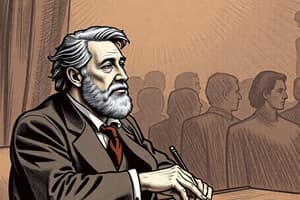Podcast
Questions and Answers
What is a common criticism of conservatism regarding its approach to social issues?
What is a common criticism of conservatism regarding its approach to social issues?
- It is often resistant to addressing inequality. (correct)
- It advocates for the dismantling of existing power structures.
- It actively promotes equality and social justice.
- It encourages rapid social change.
Which of the following best describes the misconception about conservatism?
Which of the following best describes the misconception about conservatism?
- Conservatism has a singular perspective on all social issues.
- It uniformly opposes any form of progressive change. (correct)
- It encompasses a wide range of viewpoints and philosophies.
- Conservatism solely exists as a political ideology.
What aspect of foreign policy is often emphasized by conservatism?
What aspect of foreign policy is often emphasized by conservatism?
- Promotion of social justice worldwide.
- Strong national defense and global leadership. (correct)
- Complete withdrawal from international affairs.
- Isolationism and non-intervention.
What do critics argue about the conservative focus on tradition?
What do critics argue about the conservative focus on tradition?
What is one of the challenges noted regarding implementing conservative principles?
What is one of the challenges noted regarding implementing conservative principles?
What is the main principle behind conservatism regarding social change?
What is the main principle behind conservatism regarding social change?
Which of these statements best reflects conservative thinking about the role of the state?
Which of these statements best reflects conservative thinking about the role of the state?
What is Edmund Burke's primary contribution to conservative thought?
What is Edmund Burke's primary contribution to conservative thought?
Which of these statements best reflects a core principle of conservatism regarding societal stability?
Which of these statements best reflects a core principle of conservatism regarding societal stability?
Which of these is NOT a characteristic of conservative economic policies?
Which of these is NOT a characteristic of conservative economic policies?
Which of these historical events significantly influenced the development of conservatism?
Which of these historical events significantly influenced the development of conservatism?
What distinguishes traditional from modern conservatism?
What distinguishes traditional from modern conservatism?
Which of these statements best describes the conservative approach to social issues?
Which of these statements best describes the conservative approach to social issues?
Flashcards
Conservatism
Conservatism
A political philosophy emphasizing tradition, limited government, individual responsibility, and free markets.
Isolationism
Isolationism
The belief that a nation should focus on its own internal affairs and avoid international involvement.
Interventionism
Interventionism
The stance that a nation should actively participate in international relations, often through military and diplomatic interventions.
Conservatism stifles progress
Conservatism stifles progress
Signup and view all the flashcards
Conservatism and the status quo
Conservatism and the status quo
Signup and view all the flashcards
Preservation of Social Order
Preservation of Social Order
Signup and view all the flashcards
Individual Responsibility
Individual Responsibility
Signup and view all the flashcards
Limited Government
Limited Government
Signup and view all the flashcards
Edmund Burke
Edmund Burke
Signup and view all the flashcards
Schools of Conservative Thought
Schools of Conservative Thought
Signup and view all the flashcards
Conservative Economic Policy
Conservative Economic Policy
Signup and view all the flashcards
Conservative Social Views
Conservative Social Views
Signup and view all the flashcards
Study Notes
Core tenets of conservatism
- Conservatism emphasizes tradition, hierarchy, and established institutions. It generally advocates for maintaining the status quo and gradual change rather than radical transformation.
- A core principle is preservation of social order and stability. This often translates into valuing existing social structures and institutions.
- Conservatism typically emphasizes individual responsibility and self-reliance. It often views the state as having a limited role in regulating the economy and personal life.
- It often champions a strong national defense and a robust sense of patriotism.
Historical evolution of conservatism
- Conservative thought has manifested in various forms throughout history. Early forms emerged in reactions against rapid social and political change.
- Different eras have witnessed divergent expressions of conservative ideals. The response to the French Revolution, industrialization, and the rise of Marxism/Communism provided different focal points for conservatism.
- Modern conservatism is a complex political ideology with various schools of thought and diverse views on economic policy and social issues.
Key figures and schools of thought
- Edmund Burke is considered a foundational figure in modern conservative thought. His emphasis on gradual change and respect for tradition significantly influenced subsequent conservative thinkers.
- Other important figures include various thinkers associated with specific historical contexts, evolving over time.
- Different schools of thought within conservatism (e.g., classical liberalism, libertarianism) express varying views on economic and social policy.
- A major distinction is often drawn between traditional conservatism and more modern iterations of the ideology, with varying emphasis on specific aspects of tradition and social change.
Conservative approaches to key issues
- Economy: Often emphasizes free markets, limited government intervention, and lower taxes. This often contrasts with approaches seen in other ideologies, such as stronger government regulation, social safety nets, etc. Support for private enterprise and entrepreneurship is commonly seen.
- Social issues: Generally emphasizes maintaining traditional social norms and values. This can vary widely, ranging from staunch opposition to any change to more moderate views seeking to preserve core aspects of a society.
- Foreign policy: Often advocates for a strong national defense, global leadership, and involvement in international affairs with a focus on security and promoting national interests. Different schools of thought regarding isolationism vs. interventionism can occur within conservatism itself.
Criticisms of conservatism
- Critics sometimes argue that conservatism can stifle progress and prevent needed social change.
- It's sometimes seen as resistant to addressing inequality and social injustice. Specific criticism centers on whether the focus on tradition and existing power structures perpetuates systemic issues.
- Accusations of being excessively focused on maintaining the status quo at the expense of adaptation to changing societal needs are sometimes levied.
- Critics also point to potential challenges of implementing conservative principles in a dynamic and diverse world.
Common misconceptions about conservatism
- Conservatism is sometimes stereotyped as being uniformly opposed to any progressive change. However, there is diversity within conservative viewpoints.
- It is not always anti-intellectualism. Varying degrees of support for intellectual pursuits can be found among conservatives, though varying views on the role of intellect in challenging tradition may exist.
- Conservatism may be seen as solely a political ideology, but it can also influence economic and social philosophy.
- It does not always have a monolithic approach, as demonstrated by the wide range of viewpoints.
- Conservatism can be seen as inclusive of different intellectual and religious traditions, within its varied schools of thought.
Studying That Suits You
Use AI to generate personalized quizzes and flashcards to suit your learning preferences.




